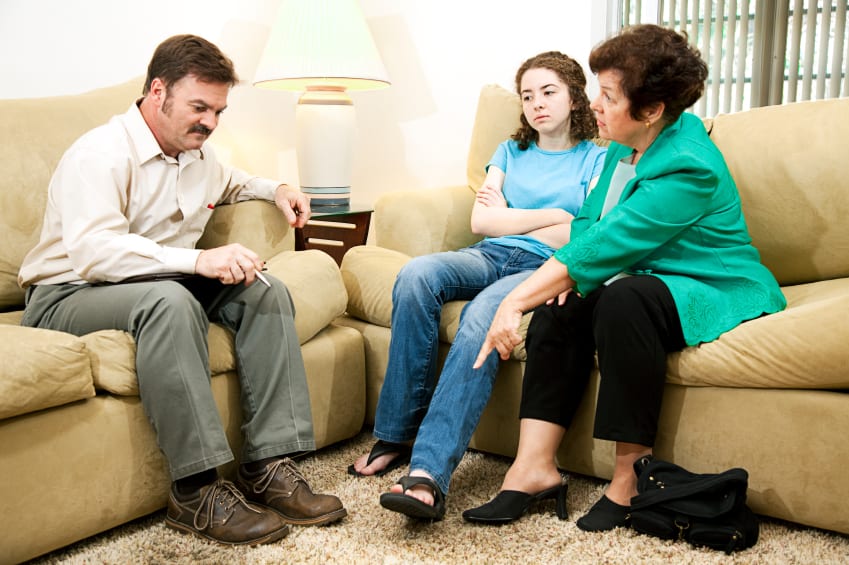 “I’m not sure if I’m going to do football next year,” my son told me when he was a high school freshman. “I like it, but I don’t love it.”
“I’m not sure if I’m going to do football next year,” my son told me when he was a high school freshman. “I like it, but I don’t love it.”
I responded with something generic like, “That’s fine, honey, whatever you want to do.”
He gave me a knowing smile. “You want me to play,” he said.
“Not if you’re not enjoying it. I really don’t care if you play or not.”
“Yes, you do,” he insisted smugly. “You care.”
“Because I love seeing my kid come home with bruises up and down his arms?” I retorted, fully on the defensive. “Trust me, I could stand it if you didn’t play.”
Ah, proud moments in parenting.
Thinking about it later, I wondered how he’d gotten the impression I was so gung-ho about football. I’m not much of a sports fan, and I am a bit of a worry wart about injuries. Yet I had encouraged him to play. He’s a big, strong kid who loves to wrestle with his brothers, and I thought he’d like it. He might even love it.
And like most parents, I’m a sucker for anything my kids are passionate about. There are few things that give me more joy in life than seeing my kids find joy in life. (Hopefully that partly makes up for the snotty retort about bruises.)
There seems to be an ever-expanding array of youth activities these days, many more than I remember from my own childhood. Surprisingly, despite this abundance of opportunities for kids to find things they love to do, adolescent depression has become a major, growing concern. And not just for the kids with unhappy home lives or obvious difficulties. More and more, kids with all the advantages of financial stability and supportive parents report feeling bleak and anxious, resorting to self-destructive behaviors like substance abuse and self-injury. How could that be?
A while back I read a book called The Price of Privilege: How Parental Pressure and Material Advantage are Creating a Generation of Disconnected and Unhappy Kids. It was a fascinating read. The part that particularly caught my eye was the description of the “toxic brew of achievement pressure and isolation from parents.” Author Madeline Levine says that while these things “appear to be mutually exclusive (somebody has to be putting the pressure on), they are not . . . We can be overinvolved in the wrong things, and underinvolved in the right things.”
With the best of intentions, we parents want our kids to be successful at the things they’re involved in, and we want to be supportive. Maybe we go to every game, volunteer to coach the team or design the program for a performance. We get involved — sometimes a little too much. We become invested in the outcome. We want them to be the star, not only because it’s wonderful for our kid to have the experience of being the best at something, but — let’s be honest — it’s kind of wonderful for us, too.
Levine explains that while we’re busy pushing them to achieve, we’re not connecting with them on their terms. We need to spend more time eating dinner together, listening instead of directing, joking around instead of haranguing about mediocre grades or performance.
Don’t get me wrong, I’m a great believer in haranguing. Just ask my kids. But is the pressure I put on them to study a little harder or hit the pool to get ready for swim team as necessary as I think it is, as often as I think it is?
Levine says that too many parents are “consistently making it to their kid’s soccer game, but inconsistently making it to the dinner table.” The message is clear: I care more about your extra curriculars than I care about sharing a meal with you. For some, that’s true. We all know parents who never seem to be around except when they’re screaming maniacally from the sidelines.
And yet that may not be true at all! Some may have jobs that prevent them from getting home for dinner, but are able to get to games or performances on the weekends. What’s important, however, is not the message we think we’re sending, but the message they’re actually receiving. My son assumed my deep commitment to his football career because I attended his games and mentioned it when someone asked what he was up to. I was excited about the possibility of his finding yet another thing to be passionate about. But since he’s not, I’m over it. Somehow he didn’t get that part.
A major theme of the book is that “The most important task of childhood and adolescence is a sense of self.” Kids need room to try things, be unexceptional at them and enjoy them anyway. And they need to do it without us breathing down their necks about “being the best” or whether the activity “looks good on a college application.” A kid has to decide for himself that, despite being the star goalie, he’s burned out and wants to audition for the play. As parents we need to be alert to that fine line between caring and caring too much.
You often hear successful people saying “my parents pushed me to achieve.” I wonder if there are more adults saying that to auditoriums full of admirers . . . or to therapists. There’s one thing most therapists probably don’t hear very often.
“My parents really loved me for who I was and let me decide what I was passionate about.”





